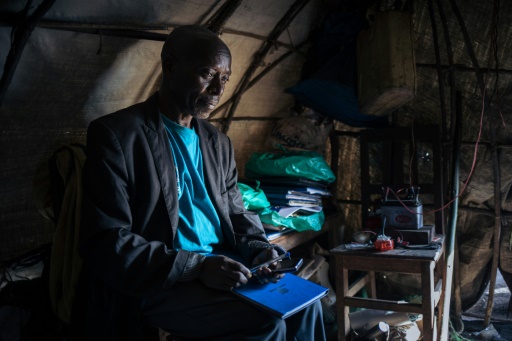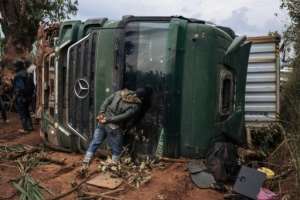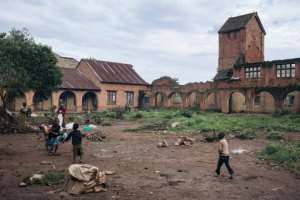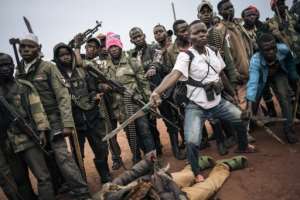
[ad_1]
“The future is dark,” sighs Joachim Lobo, a teacher who longs to “take the chalk” and meet his students, if peace is ever restored in the northeast of the Democratic Republic of the Congo.
“I lost my job because of all this nonsense,” says Lobo of communal violence in the gold-rich province of Ituri, where he taught French and philosophy, speaking with the modesty and modesty characteristic of the Congolese people in the face of suffering.
“You see how we can rebel.”
The 60-year-old father of nine has become one of tens of thousands of civilians displaced in Ituri since violence resumed in December 2017 in the Djugu and Mahagi areas.
In 2019, he fled Sombuso, his hometown in the devastated Djugu territory.
Lobo lives today in a camp for displaced persons in Loda, 20 kilometers (12 miles) from his home and located near a base of foreign troops serving in the UN mission in Congo (MONUSCO).
The daily conditions are dire, he says. “No latrines, no food, no drinking water, no medical care.”
 A passerby looks into a capsized truck in the middle of National Highway 27 in Ituri. By ALEXIS HUGUET (AFP)
A passerby looks into a capsized truck in the middle of National Highway 27 in Ituri. By ALEXIS HUGUET (AFP) Lobo belongs to the Hema community, traditionally known as ranchers and traders, and he left Sombuso to escape the brutality of a wing of the Congo Development Cooperative (Codeco) created by the Lendu people.
Experts explain that Codeco appears to group together various sects of militiamen who claim to defend the property rights of the Lendu farming communities in Djugu territory.
‘A responsible government’
The Lendu militias, known for their animist beliefs and rituals, are responsible for the massacre of several hundred Hema civilians.
This is not the first time that “Papa Joachim” fled the violence in Ituri, to become a living memory of the wounds of two decades and more.
 Internally displaced children play in the courtyard of the Minor Seminary, destroyed during the Ituri War (1999-2003), in Fataki. By ALEXIS HUGUET (AFP)
Internally displaced children play in the courtyard of the Minor Seminary, destroyed during the Ituri War (1999-2003), in Fataki. By ALEXIS HUGUET (AFP) In 1999, he left his home after the outbreak of the Second Congo War (1998-2003), in which the armies of more than half a dozen African countries entered the vast DRC. The violence cost tens of thousands of lives in Ituri.
At the time, Lendu and Hema were killing each other in militia attacks, which were stopped in 2003 by Operation Artemis, a military intervention by a United Nations-backed European Union Force (EUFOR).
When violence resumed in 2017, there were stark differences from the wartime clashes.
The Hemas have not reconstituted their militias, and public figures lendu condemn the raids carried out in their name by Codeco forces.
Neighboring Uganda does not appear to be playing any role across the border in Ituri, after being convicted by the International Court of Justice in 2005 for illegal armed aggression and violation of territorial sovereignty during the “Great African War”.
The court ordered Uganda to pay reparations to the Democratic Republic of the Congo, but today the gold trade from Bunia in Ituri and Butembo in North Kivu province to Entebbe International Airport in Uganda is doing well, according to NGO Impact. , which seeks to help artisanal miners.
“The future is dark,” says Papa Joachim. “We thought we would have a responsible government, but we don’t know when we can return to our land.”
Inverted in January 2019, President Felix Tshisekedi denounced an “attempted genocide” and a “plot” during a rare visit to Bunia in July of that year, at the height of an outbreak of violence.
He announced a “large-scale” military operation called the “Ituri Tempest” against the attackers, which led to the assassination of a Codeco chief.
‘A rebel like you’
A year later, Tshisekedi sent a delegation of former World War II militia chiefs in the Congo to negotiate the surrender of the pro-Lendu fighters.
 Militiamen, including children, from the armed group Codeco. By ALEXIS HUGUET (AFP)
Militiamen, including children, from the armed group Codeco. By ALEXIS HUGUET (AFP) The team was led by Floribert Ndjabu, a man who served 15 years in pretrial detention on suspicion of the murder of nine UN peacekeepers in 2005.
“I told them: ‘I was a rebel like you, you have nothing to teach me,'” Ndjabu told AFP.
The result of the talks has been a notable decrease in the number of deadly raids, according to witness testimony.
Key roads that had been blocked, such as the RN27 that links the Democratic Republic of Congo and Uganda, are again open to traffic, but the vehicles are escorted by the army, AFP saw.
Part of the population remains skeptical about any peace process.
“We need military pressure, with sufficient means to allow the army to secure the population and enforce peace, while justice must take care of criminals,” said Agathe Gipatho, a 60-year-old peasant, during an exchange with members of the Alur community in Nioka.
“People tend to go back to their villages,” said Dieudonne Kpadyu Mnyoro. “But their main concern is security, an end to the violence.”
A merchant and village chief from Hema, Mnyoro and more than 1,200 families took refuge last March in the ruined buildings of Fataki, a Catholic parish destroyed in the Second Congo War.
In Ituri, the religious buildings are like men and women. They all bear the scars of conflict.